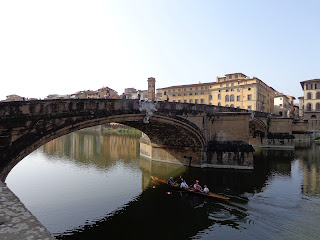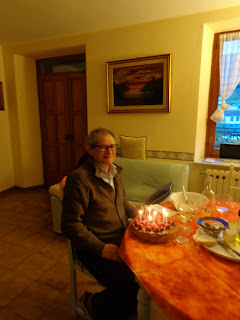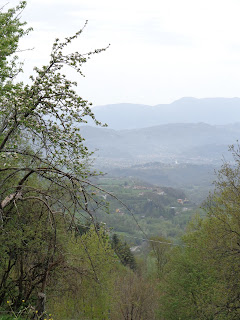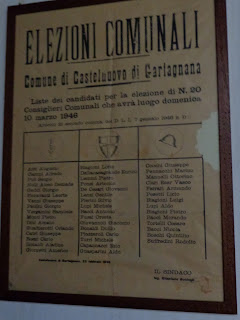Francesca
picks us up at 8:30 a.m. to go with her to the nearby village of Gorfigliano.
The Custodi del Piano, a local group (of which Francesca is a member) dedicated
to preserving nature in the area, is holding a fundraising event. We have no
idea what to expect, but Francesca has brought along two extra pair of rubber
boots for us. We stop along the way for a caffe (Francesca tells us she cannot
bear to go without her morning cappuccino. We are agreeable, being fond of our
coffee as well).
We arrive
and are introduced to Alessandro, who owns the land we'll be exploring today,
and is a founding member of the Custodi del Piano. Formed two years ago with
three members, it has grown to 15 ("Slowly, slowly," says
Alessandro).
Today's adventure will
include foraging for edible herbs with an expert who has come to the village
from Lucca.
The
guide speaks Italian only, so we understand only what Francesca and others who
speak English tell us. When the guide points out several herbs, he says,
"mortale." We get the message. Mark, one of the other participants on
the tour (he and his wife Michelle are from England
and have a home in Tuscany),
shares a piece of wisdom from the tour guide: "In nature, whenever you
have a lethal plant, the one next to it will be the antidote. That's the
balance of nature." I trust in nature's brilliance, but won't be putting
this one to the test today.
Although
many herbs are new to me, we see the familiar dandelion (dente de lion - lion's
tooth - I will never look at the weed the same way again!). Francesca, braver
and slightly more familiar than we are (although she still counts herself a
beginner forager), gathers some thyme and other herbs.
For me,
today is less about the herbs and more about the people and the surroundings.
We are rambling the fields with locals and a few other visitors, and while we
can't understand the specifics of the tour, we can soak up the experience.
The ground
is wet from more than a day of rain, feeling spongy beneath our feet; the boots
are a blessing. Since Judith and I can't understand the tour itself, Mark
regales us with stories and facts. On the hillside, we can see a marble quarry
- home of Carrerra marble. According to Mark, Michaelangelo would only carve
Carrerra marble. Picasso, in addition to being a painter, was also a sculptor.
He once sculpted a large horse (40x50x30) out of marble and a woman said to
him, "It must be difficult to carve a horse from a block of marble."
He responded, "Not really. I just cut out all the bits that don't look
like a horse!"


When Mark
and Michelle were househunting in Tuscany,
they noted to the real estate agent that no one grows flowers. "You can't
eat flowers," said the agent, and Mark notes that the Tuscans waste
nothing – all plants can all be eaten. "They have a memory of
hunger," says Francesca. "It is a long memory," says Mark. He
says in Lucca,
there are flowers everywhere (we saw this for ourselves). It is a sign of
wealth.
Francesca
tells us that there are many wild boar (cinghiale) in the area. While one
species of local boar originated in the area, humans introduced another
species, which produces more offspring, and since there are no natural
predators to kill the boar, they are now overpopulated; human intervention gone
awry as it does so many other places when trying to interfere with nature.
We see and
hear swallows (rondine) as they swoop in the sky. "They are a sign of
spring," says Francesca, who tells us the birds winter in Africa.
One of the
participants stops and kneels down on the ground, staring. Several of us gather
to see a butterfly (farfalla), whose wings look as if they've been intricately
painted by a skilled Italian artist. On top of each wing is a small leaf-like
shape that looks as if it's been woven in gold. Its wings move almost
imperceptibly in and out, like breathing.
We walk
past a stream, water running over raw marble and rock, and I wade into the
water in my borrowed rubber boots. "You are a
little bit crazy," laughs Francesca.
As we walk
back toward the farm for lunch, I have a moment to talk to Alessandro. While he
works outside of the village during the week to make a living, his heart is here
- on the land. This place, which is his love and that of his family, fills his
weekends. "You do that you like," he says. "You do that you like.
Psychology," he says, pointing to his head, "...and soul," he
says, placing his hand on his heart.
The group
returns to the farm, hungry for lunch. There are tents, tables and benches set
up outside, and there are bread and wine on the table. Before long, more food
is delivered to us - a form of scrambled eggs mixed with herbs, followed by
pasta with a sauce of oil and nuts, prepared outdoors by our hosts (we watched
them work the pasta with their hands first thing this morning).



Francesca
gets a fresh bottle of red wine and begins to pour. She says, "Sometimes
people ask me: ‘Do you drink wine?’ I say, ‘I'm from Venice!’" Not suprisingly, we have
noticed many grapevines in our travels so far. Judith asks if many people use
their own grapes to make wine to sell, or if they simply make it for their own
consumption. Mark tells us farmers will sell their grapes (as long as they are
certified as a particular variety, such as Merlot) to a co-operative, which
will press them and make them into wine. "No sulfites. 100 per cent
wine," he says. It is delicious. Mark recommends trying
"fragolino," a light strawberry sparkling wine, while we are in Italy. I will
keep an eye out for it.
Today the clouds have been unpredictable,
sometimes sprinkling, sometimes not, but generously they spare us a downpour.
As we sit eating our lunch, the sun bursts out; everyone cheers.
As
enjoyable as the food and wine is the conversation. Topics include the Scottish
separatist movement (a conversation led by Mark and a friend from Britain) and separatist movements in general
(Judith and I are able to chime in with our knowledge of Quebec), and the state of the European
Union. Unemployment is remarkably high in the EU (one of the men says it's more
than 50 per cent among youth in Spain).
Francesca says many young people are living off the retirement savings of their
parents.
Steven, a
friend of Mark and Michelle’s, also from Britain, pipes up. "We're in a
field drinking wine. Life is not so bad!" Francesca joins in.
"Couragio. We must be courageous in everything. Let's toast - to the
future - have faith!" We hold up our plastic cups of wine and touch them
together. To faith - and to the future.
We finish
our meal, and one of the lovely women who prepared our meal comes to see how we
enjoyed it. "We did it with a lot of love," she says. "We could
taste it," I tell her.
Before we
leave, I stop to thank Alessandro. As is customary, he leans in to kiss me on
both cheeks, and I do the same to him. "Thank you for coming," he
says.
"Thank
you for having us."
"It's
a little piece of paradise here," he says. "Tell your friends."
"It is a little piece of paradise,” I say. “I
will."


















































